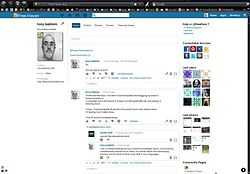Friendica
 | |
 | |
| Original author(s) | Mike Macgirvin |
|---|---|
| Developer(s) | Friendica community |
| Stable release | 3.2 / October 14, 2013 |
| Written in | PHP |
| Operating system | Cross-platform |
| Type | Social network service |
| License | AGPL |
| Website | Friendica |
Friendica (formerly known as Friendika) is open source software that implements a distributed social network. Before it became Friendika, the project started initially as Mistpark, developed by Mike Macgirvin,[citation needed] a software developer formerly employed by Symantec Corporation, America Online (AOL), Sun Microsystems, Netscape Communications, and Stanford University who had worked on the original Netscape Navigator project, among others. Friendica has an emphasis on extensive privacy settings and easy server installation. It aims to federate with as many other social networks as possible.
There is no corporation behind Friendica. Friendica sites are run by private individuals, and the developers are volunteers. The project is run informally, using the platform itself to communicate and share information.[1]
Features
Friendica is decentralized, free and open source software, secure, private, modular, extensible, unincorporated, and federated.[2]
Currently, Friendica users can integrate contacts from Facebook, Twitter, Diaspora, StatusNet and other services in their social streams, and RSS feeds. Communication is bi-directional wherever possible. There is also a bridge to include email contacts. Additionally, connectors allow cross-posting to blog platforms like WordPress, Livejournal, Tumblr and Posterous.[2]
The developers try to make installation of the server software easy for users with little technical expertise, arguing that decentralization on small servers is a key safeguard of online freedom and privacy. Friendica can even be installed on shared hosts, with a degree of simplicity similar to WordPress installation. Users can also elect to join public sites run by volunteers, thus avoiding installation entirely.[3]
Friendica, like StatusNet, also supports the OStatus protocol suite, which allows servers to route status updates and notifications between each other in real time.[citation needed]
Reception
Friendica has been endorsed by the GNU Telephony project aka GNU SIP Witch.[4]
Friendica was cited in January 2012 by Infoshop News as an "alternative to Google+ and Facebook" to be used on the Occupy Nigeria movement.[5]
In January 2012 Free Software Foundation Europe's blog cited Friendica as a reasonable alternative to centralized and controlled social networks such as Facebook or Google+.[6]
Biblical Notes writer J. Randal Matheny described Friendica in January 2012 as "One social networking option flying under the radar until recently deserves consideration as an already stable platform with a wide range of options, applications, plug-ins, and possibilities for opening up the Internet."[7]
In February 2012, the German computer magazine c't wrote: "Friendica demonstrates how decentralized social networks can become widely accepted."[8] Another German publication, the professional magazine t3n listed Friendica as a Facebook rival in an online article in March 2012 about Facebook alternatives. It compared Friendica with similar social networks like Diaspora and identi.ca.[9]
MSN Tech & Gadgets contributor Emma Boyes wrote about Friendica in May 2012: "why you'll love it: you can use it to access all the other social networks and get recommendations of new friends and groups to join. Friendica is open source and decentralised. There's no corporation behind it and there are extensive privacy settings. You can choose from a variety of user interfaces and it boasts some cool features - for instance, being able to key in a list of your interests and use the 'profile match' feature to recommend other users who share them with you. A word of warning, though, the site is not as user-friendly as the others on this list, so it may be this one is one for the geeks."[10]
See also
- Distributed Social Network Software Comparison
References
- ↑ Macgirvin, Mike (undated). "Somebody asked me...". Friendica. Retrieved 2012-03-28.
- ↑ 2.0 2.1 "Features". friendica. Retrieved 2012-03-28.
- ↑ "Friendica Public Portals". Friendica. 2012-03-28. Retrieved 2012-03-28.
- ↑ "GNU Telephony". GNU Telephony. Retrieved 2012-03-29.
- ↑ "A Social Network Alternative for Occupy Nigeria". Infoshop News. 2012-01-16. Retrieved 2012-03-29.
- ↑ Grote, Torsten (2012-01-23). "Dradio Wissen: Dezentrale Soziale Netzwerke". FSFE blog. Retrieved 2012-03-30.
- ↑ Matheny, J. Randal (2012-01-29). "A smarter way to social networking". Biblical Notes. Retrieved 2012-03-30.
- ↑ "Diaspora und andere Facebook-Alternativen - c't-Archiv, 5/2012, Seite 136". Heise.de. Retrieved 2012-03-28.
- ↑ "Facebook-Alternativen: Große und kleine Rivalen des sozialen Netzwerks". t3n Magazin. 2012-03-28. Retrieved 2012-03-29.
- ↑ Boyes, Emma (2012-05-18). "Nine social networks more interesting than Facebook". MSN Tech & Gadgets. Retrieved 2012-05-23.
External links
| ||||||||||||||||||||